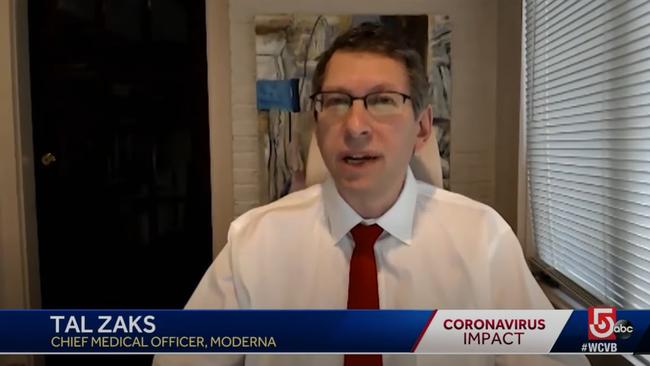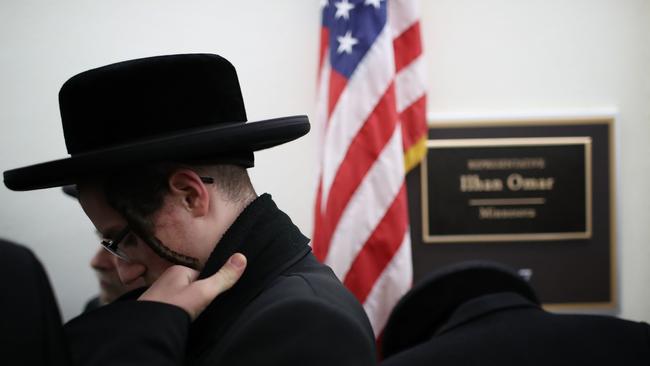Plague and old prejudices: anti-Semitism goes anti-vax
The pandemic has widened the divide between communities of belief and communities of knowledge.

In late July last year, American pharmaceutical company Pfizer, in collaboration with German company BioNTech, founded by the husband-and-wife scientific team Ugur Sahin and Ozlem Tureci, began the phase three clinical trials that would result, four months later, in the announcement of the first COVID-19 vaccine ready for manufacture and distribution.
Pfizer’s chief executive is Albert Bourla, born and educated in the Thracian metropolis of Thessaloniki (erstwhile Salonica), while his two Turkish collaborators come from families who immigrated to Germany. Both their family histories, not to mention their research partnership, run spectacularly counter to the populist anti-immigrant rhetoric that has driven hard-right nationalism in Germany for the past decade. While not making a great show of the fact, Bourla and his two Turkish partners have been content to allow their transnational collaboration to establish its own exemplary significance for an inescapably interconnected world.
You would assume, then, that a partnership across historically adversarial national frontiers, a collaboration based on the universal imperatives of science, would deal a blow to nationalist intransigence. But modern times being what they are, you would be mistaken. There is another fact about some of the leading scientist-entrepreneurs responsible for developing and delivering RNA messenger vaccines with a speed and urgency hitherto thought inconceivable, a fact that has not escaped the attention of the preternaturally suspicious: many of the most prominent among them are Jewish.
The chief medical officer of Moderna is Tal Zaks, an Israeli living in the US; the chief scientific officer of Pfizer, Mikael Dolsten, is a Swedish Jew — his father a two-generation resident of Halmstad, his mother an Austrian Jew who escaped the Holocaust. Bourla, who, like Dolsten, lives in New York state, is by origin a Greek Sephardi Jew from one of the few Jewish families to survive the Salonica Holocaust that took the lives of 95 per cent of the 56,000 Jews living in that ancient city of Jewish settlement.
The extermination of the vast majority of Salonica’s Jews was followed after the war by the expedient disappearance of historical memory. Though there had been some evasion and resistance on the part of some Athenians, what took place in Salonica was notable for the absence of opposition and, as in so much of Nazi-occupied Europe, the collaboration of the local community.
For 70 years there was no visible acknowledgment of what had taken place until, in 2014, mayor Yiannis Boutaris pushed for a modest memorial on the university campus. Even so, reading the inscription would lead one to believe that the annihilation had been the work of the Germans alone. The little memorial site has been the target of repeated anti-Semitic desecration: painted vandalism in 2017; smashed headstones in 2018 and in late January 2019, just a few days before International Holocaust Remembrance Day.

None of this, however, prevented Greek media and politicians celebrating Bourla as a modern Greek hero when, in November last year, Pfizer announced the astonishing success rate of its vaccine. An instant love fest broke out from New York to Athens to Mainz, the headquarters of BioNTech. Except for one newspaper, Makeleio, which broke ranks during the week of Pfizer’s announcement.
Bourla, its front page screamed, was no hero but a Jewish veterinarian “about to stick a needle in us! Forced admission into concentration camps like herds!” Just in case readers failed to grasp the point, a photo of Dr Josef Mengele was printed alongside that of Bourla as comparable fiends of demonic experimentation. A few days later a second article accused Bourla, the “Greek Jew”, of “trousering millions for the ‘Israeli Council’ ”.
Makeleio is a publication of far-right fascist and neo-Nazi nationalists of the likes of Golden Dawn, with eight per cent of Greek newspaper readership. Which is not to say it is without influence. In the Anti-Defamation League’s most recent survey of attitudes towards Jews in European countries, Greece was reported as having one of the highest percentages of population endorsing perennial items of the anti-Semitic repertoire: Jews wielding too much influence in the media, possessing too much money, dominating the globalised world and so on.
The paradoxical exploitation of Holocaust tropes and signs to refresh anti-Semitism — turning the victims of the Shoah into its new perpetrators — has been standard polemic in the more venomous zones of anti-Zionist diatribes. Drawing on hoary tropes of the medieval blood libel, hated figures such as Ariel Sharon and Benjamin Netanyahu have been represented as shedding or even drinking the blood of murdered children. The COVID-19 twist on these horrific lunacies is to equate the imposition of vaccines and even masks with a new Holocaust.
Anti-vaxxers and anti-maskers have taken to wearing yellow stars sewn on their coats; cartoons and signs have been published showing “victims” of compulsory social distancing and mask wearing being herded on to cattle trucks. The jaw-dropping stupidity of equating the means of saving life with the historic insignia of mass murder in no way mitigates its obscenity.

But, then, logic and reason have no place in crowd paranoia, as evident from the mob invading the US Capitol on January 6 wearing T-shirts bearing the logo “Camp Auschwitz” and “6MWE” (six million weren’t enough). Still more distressing, a few Haredim have been guilty of the same misappropriation of Shoah memes to protest against the enforcement of public health measures. The cry of “Nazi” is heard in Mea Shearim when mass gatherings are broken up or attempts are made to close synagogues and yeshivot (religious schools). Masks sewn with yellow stars have been seen in New York and Israel.
Was it idle to assume that, if from nothing other than collective self-preservation, the objective truths of science and the imperatives of public health derived from them might have constrained the most extreme assertions of populist paranoia and revelation-based religious conviction? Seen from the US, it seems so. For a long time now, the authority of knowledge along with the institutions created to further it — research laboratories, universities — have been under siege from those who march beneath the banner of pure belief.
Nor has the science of the pandemic scotched populism’s appetite for conspiracy theories, and still less has it resolved the great American epistemological crisis of the reception of knowledge. If anything, it has deepened it.
Myths about the origins of the virus almost immediately followed its first appearance. Helped by initial Chinese lack of transparency, Donald Trump’s labelling of the “China virus” (repeated to the bitter end of his presidency) was always meant to imply the whole thing was a plot cooked up in a state laboratory to sabotage his re-election and wreak havoc on the US economy, which under his stewardship had struck back against Chinese domination.
Crazier origin myths swiftly followed. The novel coronavirus was a fiendish invention of Bill Gates, and the vaccination was a pretext to implant 5G chips in the bodies of millions who would become enslaved to Microsoft and its master. And, inevitably, the virus was ascribed to George Soros, who became yet again the arch-demon of an international (read: Jewish) cabal running deep state and pedophile command and control. Lest anyone imagine these assertions were the stock of a tiny lunatic fringe, it has been estimated that QAnon has a following of tens if not hundreds of thousands in the US alone. Twenty congressional candidates in recent elections endorsed this conspiracy theory, two of whom — Lauren Boebert of Colorado and Marjorie Taylor Greene of Georgia — were elected and show no sign of repenting or moderating those extreme views. Greene has expressly said being called an anti-Semite will not deter her from attacking Soros as the source of contemporary wickedness.

It did not help that the former president was a habitual “They-Sayist”, as in “they say” or “people say” whichever fantasy, unsupported by a scintilla of evidence, might help his re-election. Thus “they say” hydroxychloroquine might be the miracle virus-stopper; “they say” injected bleach might do a terrific disinfecting job; “they say” that in warmer weather COVID will be gone, and so on — all aimed at minimising the COVID threat, even when records of phone conversations show Trump understood its magnitude.
The daily authorisation of fantasy and falsehood allowed into mainstream public opinion every kind of conspiratorial explanation of how the plague arose and kept its grip. For as Cass Sunstein and Adrian Vermeule pointed out in a fine paper in 2008, the persuasiveness of conspiracy theories owes much to providing wraparound, ostensibly coherent explanations for phenomena that otherwise might be seen as the unsettling product of chance and contingency — the forces that so often determine the course of history.
Once the virus had been established as the instrument of a malevolent plot, set in action by hidden actors, it followed that calls for mask wearing and the restriction of free movement would be construed as a conspiracy against personal and religious freedoms. The right to go unmasked in indoor spaces such as supermarkets, often militantly and sometimes violently asserted, as well as the right to gather in large numbers at Trump rallies or places of worship, became demonstrations of imagined constitutionally protected liberties.
When the science of public health was invoked to promote or enforce those constraints, this too was seen as part of a wicked mission bent on depriving religious believers and libertarians of God-given rights to do whatsoever they wished with their bodies, notwithstanding that much the same could be said of obeying seatbelt instructions on aeroplanes or stopping at red traffic lights.
From there, it was but a small step to regarding the entire phenomenon of COVID-19 as a hoax (as Trump once called it) or a calculated design to strip Americans of the fundamental liberties that made them American. Disregarding the science or representing it as an elitist-globalist design on freedom became a patriotic calling if not an actual obligation.
Likewise, vaccines could be seen as an instrument of alien invasiveness, a mass poisoning purporting to be a salutary prophylactic. It is predictable, then, to find those arch-cosmopolitan people, the Jews, featuring in the suspicions and conspiracy theories that hold the virus itself and vaccination programs as insidious.
Not all anti-vaxxers are anti-Semites, but the latest wave of fanatical populism engendered by a reaction against lockdowns and curfews includes anti-Semitic illiberalism in its repertoire. The demonisation of Jews as, simultaneously, adepts of esoteric medical knowledge and vectors of disease goes back to the earliest expressions of Judeophobia.
But suspicion of Jewish doctors and the clinical science of their vocation, coupled with a conviction that there are times when scientific knowledge should submit to some larger imperative — political or religious — is not a monopoly of non-Jews.
Far from laying those suspicions to rest in the name of collective welfare, the pandemic has widened the divide between communities of belief and communities of knowledge, to the point where the resistance of the former to the latter becomes abusive or even violent. This in turn has raised fundamental questions about the authority of the secular state, in conditions of extreme crisis, to enforce science-based measures on communities where revelation-based beliefs are the ultimate arbiter of conduct.
This is an edited extract of Simon Schama’s Viral Prejudice and the Jews, from The Jewish Quarterly — New Populism, Old Hatreds, launching in Australia on Tuesday.

To join the conversation, please log in. Don't have an account? Register
Join the conversation, you are commenting as Logout